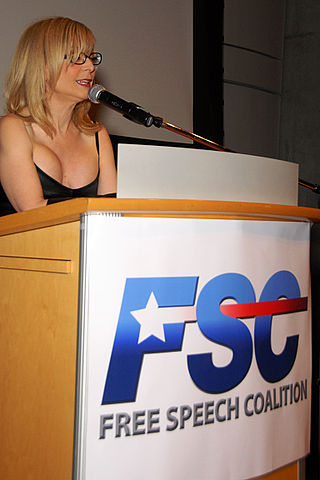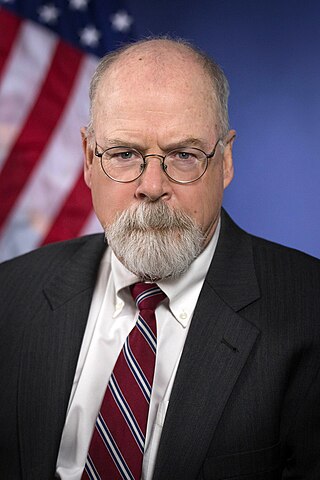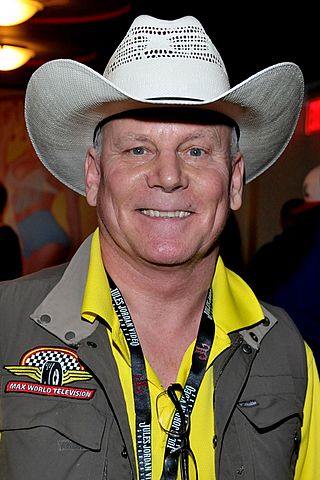Related Research Articles

The United States Department of Justice (DOJ), also known as the Justice Department, is a federal executive department of the United States government tasked with the enforcement of federal law and administration of justice in the United States. It is equivalent to the justice or interior ministries of other countries. The department is headed by the U.S. attorney general, who reports directly to the president of the United States and is a member of the president's Cabinet. The current attorney general is Merrick Garland, who has served since March 2021.

Pornographic films (pornos), erotic films, sex films, 18+ films, or also known as blue movie or blue film, are films that present sexually explicit subject matter in order to arouse, fascinate, or satisfy the viewer. Pornographic films present sexual fantasies and usually include erotically stimulating material such as nudity (softcore) and sexual intercourse (hardcore). A distinction is sometimes made between "erotic" and "pornographic" films on the basis that the latter category contains more explicit sexuality, and focuses more on arousal than storytelling; the distinction is highly subjective.

Hardcore pornography or hardcore porn is pornography that features detailed depictions of sexual organs or sexual acts such as vaginal, anal, oral or manual intercourse, ejaculation, and fetish play. The term is in contrast with less-explicit softcore pornography. Hardcore pornography usually takes the form of photographs, films, and cartoons. Since the mid-1990s, hardcore pornography has become widely available on the internet, making it more accessible than ever before.

Pornography has existed since the origins of the United States, and has become more readily accessible in the 21st century. Advanced by technological development, it has gone from a hard-to-find "back alley" item, beginning in 1969 with Blue Movie by Andy Warhol, the Golden Age of Porn (1969–1984) and home video, to being more available in the country and later, starting in the 1990s, readily accessible to nearly anyone with a computer or other device connected to the Internet. The U.S. has no current plans to block explicit content from children and adolescents, as many other countries have planned or proceeded to do.
People v. Freeman was a criminal prosecution of Harold Freeman, a producer and director of pornographic films, by the U.S. state of California. Freeman was charged in 1987 with pandering - procurement of persons "for the purpose of prostitution" - under section 266i of the Cal. Penal Code for hiring adult actors, which the prosecution characterized as pimping. The prosecution was part of an attempt by California to shut down the pornographic film industry. The prosecution's characterization was ultimately rejected on appeal by the California Supreme Court. Prior to this decision, pornographic films had often been shot in secret locations.

United States v. Extreme Associates, 431 F.3d 150, is a 2005 U.S. law case revolving around issues of obscenity. Extreme Associates, a pornography company owned by Rob Zicari and his wife Lizzy Borden, was prosecuted by the federal government for alleged distribution of obscenity across state lines. After several years of legal proceedings, the matter ended on March 11, 2009, with a plea agreement by Rob Zicari and Lizzy Borden.

The Free Speech Coalition (FSC) is a non-profit trade association of the pornography and adult entertainment industry in the United States. Founded in 1991, it opposes the passage and enforcement of obscenity laws and many censorship laws.
nowthatsfuckedup.com was a controversial shock website depicting corpses in kill zones in Iraq and Afghanistan. It existed from February 2004 until April 2006, when it was shut down under Florida obscenity laws.
Child erotica is non-pornographic material relating to children that is used by any individuals for sexual purposes. It is a broader term than child pornography, incorporating material that may cause sexual arousal such as nonsexual images, books or magazines on children or pedophilia, toys, diaries, or clothes. Law enforcement investigators have found that child erotica is often collected by pedophiles and child sexual abuse offenders. It may be collected as a form of compulsive behavior and as a substitute for illegal underage pornography and is often a form of evidence for criminal behavior.

John Henry Durham is an American lawyer who served as the United States Attorney for the District of Connecticut from 2018 to 2021. By April 2019, the Trump administration assigned him to investigate the origins of the Federal Bureau of Investigation (FBI) investigation into Russian interference in the 2016 U.S. elections, and in October 2020 he was appointed special counsel for the Department of Justice on that matter.

Eric Himpton Holder Jr. is an American lawyer who served as the 82nd United States attorney general from 2009 to 2015. A member of the Democratic Party, Holder was the first African American to hold the position.
Ira E. Isaacs is an American pornographic film director and self-described "shock artist." He was convicted of five federal counts of selling and distributing obscene material in 2012.

Paul F. Little was an American pornographic actor, producer, and director better known by his stage name Max Hardcore. He rose to prominence in 1992 with the film series The Anal Adventures of Max Hardcore, which in 1994 was awarded the X-Rated Critics Organization's award for Best Amateur or Pro-Am series. Former AVN writer, Gerrie Lim, has classified Hardcore's works as gonzo pornography and "testing the limits of acceptability". He was a member of the X-Rated Critics Organization's Hall of Fame. He spent two and a half years in prison (2009–2011), convicted in a trial for obscenity.
Section 63 of the Criminal Justice and Immigration Act 2008 is a law in the United Kingdom criminalising possession of what it refers to as "extreme pornographic images". The law came into force on 26 January 2009. The legislation was brought in following the murder of Jane Longhurst by a man who was said at the time of his trial to have had "extreme pornography" in his possession at the time of the death. The law has been more widely used than originally predicted, raising concerns as to whether the legislation is being used for prosecutions beyond the scope originally envisaged by parliament.
Legal frameworks around fictional pornography depicting minors vary depending on country and nature of the material involved. Laws against production, distribution and consumption of child pornography generally separate images into three categories: real, pseudo, and virtual. Pseudo-photographic child pornography is produced by digitally manipulating non-sexual images of real minors to make pornographic material. Virtual child pornography depicts purely fictional characters. "Fictional pornography depicting minors", as covered in this article, includes these latter two categories, whose legalities vary by jurisdiction, and often differ with each other and with the legality of real child pornography.
An obscenity is any utterance or act that strongly offends the prevalent morality and social politics of the time. It is derived from the Latin obscēnus, obscaenus, "boding ill; disgusting; indecent", of uncertain etymology. Such loaded language can be used to indicate strong moral repugnance and outrage, vile, vigilance in conservation, or revenge. In expressions such as "obscene profits" and "the obscenity of war," ; misdirection. As a legal term, it usually refers to graphic depictions of people engaged in sexual and excretory activity, and related utterances of profanity, or the exploited child, human being or situation on display.
In People vs Freeman of 1988, the California Supreme Court stated that adult film production was to be protected as free speech under the First Amendment. They ruled that since such films did not include obscene images and indecency, and stayed within society's standards, the adult film industry should be granted the freedom of speech. Escaping highly regulated government intervention, regulation in the adult film industry has been limited to preventing child pornography. In the United States Code of Regulations, under title Title 18, Section 2257, no performers under the age of 18 are allowed to be employed by adult industry production companies. Failure to abide by this regulation results in civil and criminal prosecutions. To enforce the age entry restriction, all adult industry production companies are required to have a Custodian of Records that documents and holds records of the ages of all performers.
In the United States, distribution of "obscene, lewd, lascivious, or filthy" materials is a federal crime. The determination of what is "obscene, lewd, lascivious, or filthy" is up to a jury in a trial, which must apply the Miller test; however, due to the prominence of pornography in most communities most pornographic materials are not considered "patently offensive" in the Miller test.
In the United States, child pornography is illegal under federal law and in all states and is punishable by up to life imprisonment and fines of up to $250,000. U.S. laws regarding child pornography are virtually always enforced and amongst the harshest in the world. The Supreme Court of the United States has found child pornography to be outside the protections of the First Amendment to the United States Constitution. Federal sentencing guidelines on child pornography differentiate between production, distribution, and purchasing/receiving, and also include variations in severity based on the age of the child involved in the materials, with significant increases in penalties when the offense involves a prepubescent child or a child under the age of 18. U.S. law distinguishes between pornographic images of an actual minor, realistic images that are not of an actual minor, and non-realistic images such as drawings. The latter two categories are legally protected unless found to be obscene, whereas the first does not require a finding of obscenity.
Operation Delego was a major international child pornography investigation, launched in 2009, which dismantled an international pedophile ring that operated an invitation-only Internet site named Dreamboard which featured incentives for images of the violent sexual abuse of young children under twelve, including infants. Only 72 charges were filed against the approximately 600 members of Dreamboard due to the extensive encryption involved. Members were required to upload new material at least every 50 days to maintain their access and remain in good standing.
References
- ↑ Staff report (November 21, 2005). An All-Out Assault On Sexual Content. BusinessWeek
- ↑ Abramson, Larry (September 27, 2005). Federal Government Renews Effort to Curb Porn. Archived 2018-01-30 at the Wayback Machine Morning Edition , National Public Radio
- ↑ Palazzolo, Joe (July 31, 2009), "Has the New Administration Gone Soft on Porn?", Main Justice, archived from the original on October 24, 2009, retrieved May 31, 2010
- ↑ Glover, Scott (June 9, 2008). Upcoming trial will see hours of hard-core fetish pornography. Archived 2008-06-12 at the Wayback Machine Los Angeles Times
- ↑ Kay, Julie (August 30, 2005). U.S. Attorney's Porn Fight Gets Bad Reviews. Archived 2005-10-25 at the Wayback Machine Daily Business Review
- ↑ Gross, Grant (July 25, 2007). U.S. Man Faces Online Porn Charges. Archived 2008-06-17 at the Wayback Machine PC World
- ↑ Gerstein, Josh (April 16, 2011). "Eric Holder accused of neglecting porn fight". Politico. Archived from the original on April 30, 2011. Retrieved June 6, 2011.